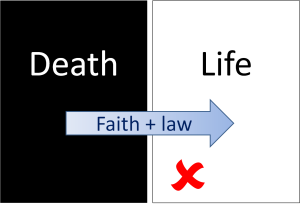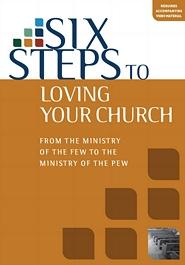Acts 15 is an internal Christian struggle about different people sharing the same faith in Jesus. Both Jew and Gentile joined together in trusting Jesus for forgiveness – and it lead to (helpful) problems.
When our church looked at this chapter, I produced some pictures to accompany the sermon. In the interests of recycling, here they are re-processed for the interwebs.
The Acts debate was internal to the ‘organisation’ – church – as different groups argued their points of view. Some Pharisees said, ‘They must obey the law, otherwise God will not save them.’ Others determined never to allow such an imposition: God saved Gentiles while they were Gentile, and without requiring a preliminary journey through Judaism.
This was an internal struggle of the mind, too, as Christians thought through the reality of what Jesus was doing. What Jesus was doing, and still does, is take people from death to life. The dead are without hope. The living are eternally blessed. The Bible uses a number of terms to describe the cross over: the new birth, cleansing, redemption, … The particular term of the Acts debate is salvation. Jesus saves dead and gives life, as in this diagram.

Importantly, salvation is totally a work of God. In shorthand, grace saves. ‘We believe that we [Jews] will be saved through the grace of the Lord Jesus just as they [Gentiles] will.’ (Acts 15:11).
Since grace is 100% of God, we know that salvation is never the result of human merit. Salvation is not a reward for doing things. So, tweaking my diagram, see the two images below. Grace is good, but merit receives the big cross.


The next two pictures parallel the above two. Grace is accepted by faith. We trust that God’s provision is sufficient and fully able to save. In contrast, merit means the ‘dead’ person must do something (even if it be minuscule) that contributes to creating new life. Merit-thinking leads to salvation by law. ‘What brings merit?’ inevitably produces ‘Follow these laws.’
It’s a huge error if one tries to combine merit with grace. Grace and faith are always obliterated by any hint of merit and law.


Yet this Bible passage holds a paradox. To communicate ‘grace without law’, the group send out this message:
“Therefore my judgment is that we should not trouble those of the Gentiles who turn to God, but should write to them to abstain from the things polluted by idols, and from sexual immorality, and from what has been strangled, and from blood. For from ancient generations Moses has had in every city those who proclaim him, for he is read every Sabbath in the synagogues.”
(Acts 15:19-21)
It sounds like: no law!; and, here are some laws for you. Or: don’t trouble Gentiles with the law; and, the Gentiles have heard the law of Moses already. Were they talking out of both sides of the mouth? They said no to circumcision – so why do they instruct about idols, immorality and food?
This is the place of my final picture. As you look at it, note that it has nothing to do with salvation. The cross-over arrow is gone.

Death has certain type of existence. So too does life. We could multiply the descriptions in each box, but I’m sure the idea is clear enough. There is such a thing as Christian living.
It’s handy to note that, quite frequently, Christian living will appear law-like. For example, if you love a Jewish person you will eat kosher food when you share a meal. Or again, every Christian will flee idols. Does kosher food bring salvation? Does God save people because they avoid idol feasts? Of course not! He saves by grace.
In Acts 15, the letter of instruction helped Gentile believers – saved by grace through faith – avoid the life of death and avoid offending Jewish Christians. Gentiles were saved, not by law. But saved Gentiles were called to live for Christ who saved them, and some of this behaviour was law-like.
Are you wary of legalism? (That’s when we place ‘law’ in the salvation arrow.) This is a legitimate concern. Make sure, however, that the teaching you condemn really does put law in that wrong place. Not all ‘law’ language is legalism.
Are you worried about Christian lax living? (That’s when we don’t bother living the godly life Jesus wants us to.) This too is a legitimate concern. Make sure, however, that you don’t give the impression that our behaviour saves us. Salvation is always only by grace.
 This is another in the Matthias Media series of Six Steps … studies. There’s some video input (two short videos each session), as well as discussion questions. It’s well-suited to use in a group, but I reckon these questions could also work for a solo reader.
This is another in the Matthias Media series of Six Steps … studies. There’s some video input (two short videos each session), as well as discussion questions. It’s well-suited to use in a group, but I reckon these questions could also work for a solo reader.










